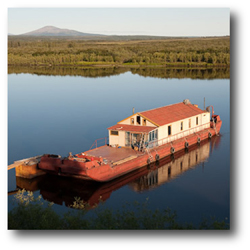For fourth year, Clark undergrads selected for ‘Rising Stars’ Arctic field program

Two Clark University undergraduates are in Siberia with an international team of scientists, including students from the United States, Russia, Norway, and Puerto Rico.
The group departed July 1 for a four-week field course in the Russian Arctic with The Polaris Project: Rising Stars in the Arctic, which is training future leaders in arctic research and education, and informing the public about the impacts of climate change—essential goals, given the rapid and profound transformations under way in the Arctic in response to global warming.
Clark students are among only 14 to earn slots for the 2011 Polaris Project field course, now in its fourth year. Clark has participated since the first of these expeditions to the Northeast Science Station in Cherskiy, Siberia (north of the Arctic Circle on the Kolyma River), a remote and visually stunning part of the world. The scientific investigations focus on forests, tundra, lakes, rivers, estuaries, and the coastal Arctic Ocean.
The Polaris Project is led by top scientists in Arctic Systems, including Clark Graduate School of Geography assistant professor Karen Frey, who has been a primary investigator on the project since its inception in 2008. Professor Frey was recently awarded four additional years (through 2015) of funding for the Polaris Project by the National Science Foundation (NSF). Clark’s 2010 Polaris Project student participants:
Dylan E. Broderick ’12 said she feels “very fortunate to have this amazing opportunity to work with other students and professionals on issues of climate change, and in such a unique part of the world.” A senior at Clark, Broderick is majoring in Geography with a concentration in Geographic Information Science (GIS), she has earned Dean’s List honors in each of her six semesters at Clark.
Emily J. Sturdivant ’13 will spend her time in Siberia studying the carbon flux between the Arctic and the atmosphere, as the Arctic responds to and determines the future of climate change. Her focus will be on the flux from Siberian waters, examining methane emissions from Siberian lakes and rivers. At Clark, Sturdivant is co-leader of the Eco-Reps, student leaders in residence halls who foster a culture of sustainability on campus and help reduce the university’s ecological footprint.
“I never dreamed I’d be going to Russia or doing field research,” Sturdivant said before departing on the project. “But now I’m learning a few words like zdrastvitcha (a simple hello) and wearing in my new heavy-duty rubber boots. I love the response I get from each person I tell I’m going to Siberia. I have no idea what to expect except for an abundance of the natural world and new experiences.”
* The Polaris Project team keeps a lively online site with frequent blog dispatches and great photographs, as well as Facebook and Twitter accounts. You can learn more and follow their progress at www.thepolarisproject.org. *
Professor Frey is not able to join her students in Siberia this summer. Instead, for the second year, she and two of her Clark Ph.D. students are with the NASA ICESCAPE research team, spending two months aboard an icebreaker studying sea ice in the Chukchi and Beaufort Seas, north of Alaska.
Frey is the lead principal investigator (PI) on an ICESCAPE project grant that totals $735,192 over the next three years.
“From its start, the Polaris Project has tried to make substantial contributions to research and education,” said Dr. R. Max Holmes, a senior scientist at the Woods Hole Research Center and director of the Polaris Project. “As the project matures, I’m particularly pleased that have we are maintaining that balance, even as productivity in both research and education are rapidly accelerating.”
In addition to the field course, The Polaris Project includes research experience for undergraduate students in the Siberian Arctic, several new arctic-focused undergraduate courses taught by project co-primary investigators at their home institutions, the opportunity for those co-PIs to initiate research programs in the Siberian Arctic, and a wide range of outreach activities. All project participants, both students and faculty, will visit kindergarten through Grade 12 classrooms to convey the excitement of polar research. This work is being supported by grant funding from the National Science Foundation.
Along with her collaborators, Frey was recently funded by NSF for four additional years of the Polaris Project (2011-2015).


